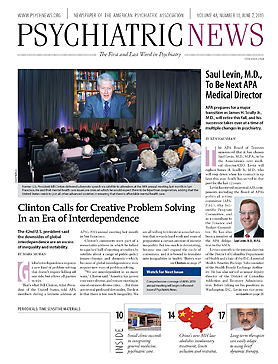The American Journal of Public Health (AJPH) has devoted one of its issues solely to the stigma that is attached to mental illness and the people who suffer from it.
The journal’s May issue was several years in the making, thanks to hard work not only by the authors of the published papers and the AJPH staff, but by staffs at the Carter Center and the Centers for Disease Control and Prevention (CDC).
Several of the people involved in the effort, as well as those who have made great strides fighting stigma, celebrated the issue’s launching at the Carter Center in Atlanta April 18.
They included former First Lady Rosalynn Carter; Thomas Bornemann, Ed.D., director of the Carter Center Mental Health Program; Wayne Giles, M.D., director of the Division of Population Health at the CDC; Benjamin Druss, M.D., Rosalynn Carter Chair of Mental Health at Emory University; and former member of Congress Tony Coelho, a major sponsor of the 1990 Americans With Disabilities Act.
Stigma Called ‘Social-Justice Issue’
“I feel like I’ve been working on stigma all my life,” Carter said. “So this is a special day for me, launching the special issue of the AJPH….All these articles about stigma are unbelievable!”
Stigma is more than just a treatment and access issue—it is also “an important social-justice issue,” stated Giles, because it can lead to the exclusion of people with mental illness from many aspects of society. Thus it is critical to implement the recommendations described in the issue’s papers, he added.
The special AJPH issue “frames stigma as a public-health problem that needs public-health solutions,” observed Druss. The fight against prejudice directed at mentally ill people is where the civil-rights movement was 40 or 50 years ago, he maintained.
Coelho related how his own experience with being looked down upon because of a neurological illness propelled him to sponsor the Americans With Disabilities Act. When he was a youth, he was diagnosed with epilepsy, yet his family persisted in believing that he was “possessed by the devil.” Later because of his epilepsy, he said, he had trouble getting employment, lost his driver’s license, lost his health insurance, and became suicidal.
Stigma Examined From Many Perspectives
Stigma is scrutinized from many different vantage points in the new issue. Some authors focus on the subject of stigma and social inclusion. Others discuss primary care, behavioral health, and public-health partnering to reduce stigma. Still others zero in on the reluctance of many people to give individuals with a mental illness positions of authority or power.
Among the authors elucidating the issues is Stephanie Welch, M.S.W., senior program manager of the California Mental Health Services Authority in Rancho Cordova, Calif., and colleagues. They reported that California’s 2004 Mental Health Services Act is not only funding mental illness prevention and early-intervention strategies, but projects aimed at reduced mental illness stigma as well. One project entails identifying and eliminating existing laws, policies, and practices that result in discrimination against the mentally ill. Another project focuses on educating elementary school children about mental illness. Yet a third tries to remove scurrilous messages about people with mental illness from Spanish-language media.
The problem of mental illness stigma directed at oneself was also addressed. “Identifying with one’s mental illness and publicly disclosing it may promote empowerment and reduce self-stigma,” Kirstin Kosyluk, M.S., program coordinator at the Center on Adherence and Self-Determination at the Illinois Institute of Technology, and colleagues, asserted in their paper. They then reviewed the research that supports this assertion and offered guidance on how to make such a disclosure.
One approach, for example, is to disclose one’s illness to select coworkers or neighbors. The benefit could be that the individual finds a small group of people who understands his or her experiences and provides support. The cost, however, could be that once the information is disclosed, the person who learns it might use it to hurt the individual who confided in them, the authors noted.
Another approach might be to indiscriminately disclose one’s illness. The benefit could be that the person doesn’t have to worry about who knows and who doesn’t and that they identify people who will be supportive. This approach, however, does have the same danger as selective disclosure.
Yet a third strategy is to actively seek audiences to educate and inform about mental illness by relating first-hand experiences, though this too comes with the caveat that some people will react negatively.
In another study published in the issue, Walter Bockting, Ph.D., of the New York State Psychiatric Institute, and colleagues asked more than 1,000 transgender individuals to complete an online survey about their mental health. Respondents reported a high prevalence of clinical depression (44 percent), anxiety (33 percent), and somatization (28 percent). Social stigma experienced by respondents was associated with their psychological distress. However, support from other transgender people decreased such distress and eased the burden of the stigma directed at them.
Transgender individuals need improved “access to mental health and social services that affirm transgender identity and promote resilience,” Bockting and his colleagues concluded.
The special stigma issue received funding from the Carter Center, the CDC, and the Substance Abuse and Mental Health Services Administration. ■

